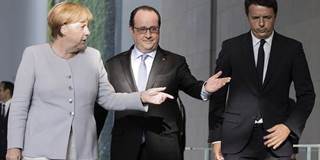In the end, despite all the warnings and dire forecasts, the British people voted to take their chances by leaving the EU. If the EU is to save itself from further disintegration, it needs to understand its own role in that decision.
CAMBRIDGE – A thoughtful British friend of mine said to me a few days before the United Kingdom’s “Brexit” referendum that he would vote for Remain because of his concern about the economic uncertainty that would follow if the UK left the European Union. But he added that he would not have favored Britain’s decision to join the EU back in 1973 had he known then how the EU would evolve.

CAMBRIDGE – A thoughtful British friend of mine said to me a few days before the United Kingdom’s “Brexit” referendum that he would vote for Remain because of his concern about the economic uncertainty that would follow if the UK left the European Union. But he added that he would not have favored Britain’s decision to join the EU back in 1973 had he known then how the EU would evolve.